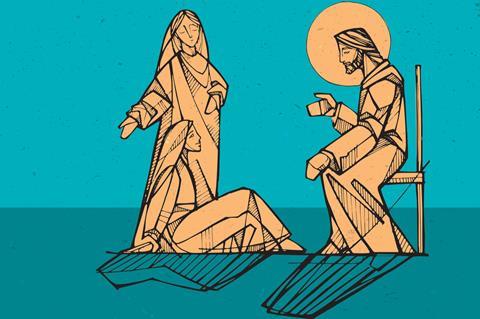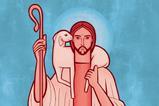Dr Lucy Peppiatt takes a look at common interpretations of the encounter between Jesus, Mary and Martha and finds them wanting

In my last column, I wrote about rest and spending time in God’s presence. A nice follow-on from this is the tale of two sisters, Martha and Mary, found in Luke 10. The Gospel story portrays Martha as distracted, disturbed and agitated, while her sister, Mary (despite the pressure placed upon women to look after the affairs of the home and serve guests) sits at Jesus’ feet to learn from him.
I used to feel ambivalent about this because, on the one hand, I loved the picture of Mary, a female disciple, learning from Jesus, and him approving of that. However, I didn’t like the way it was so often portrayed as two sisters pitted against each other; the one who pleases Jesus and the one who gets told off by him. I also didn’t like the common assumption that this was somehow a peculiarly female issue. But when I began to study the Bible in more depth, I discovered that the way I’ve heard this story explained is often neither fair to Martha, nor does justice to the fact that this story relates to everyone, not just women.
It’s not the work, but the underlying worry that’s the problem
At first glance, it does seem as though Jesus rebukes Martha in favour of Mary. Martha wants Jesus to tell Mary to help her instead of sitting at his feet. Instead, he replies: “Martha, Martha…you are worried and upset about many things, but few things are needed – or indeed only one. Mary has chosen what is better, and it will not be taken away from her.” But to put Jesus’ ‘rebuke’ in context, it’s important to remember that they were close family friends. We know this from John’s Gospel, where it says: “Now Jesus loved Martha and her sister and Lazarus” (11:5).
Honesty and faith
Jesus used to stay with Mary, Martha and Lazarus when he was in Bethany. Luke tells us it was Martha who opened her home to Jesus – this makes me wonder whether she was the eldest. When Lazarus dies (John 11), it’s Martha who goes out to meet Jesus first, showing a particular type of strength of character. In this raw moment, Jesus and Martha have an astonishing conversation. She begins by expressing her grief: “If you had been here, my brother would not have died.” In many ways, Jesus had failed them at their hour of need. But she follows up with: “But I know that even now God will give you whatever you ask.” There is both honesty and faith in her words.
Jesus prophesies that Lazarus will “rise again”, but she’s not exactly sure what he means, imagining he’s talking of the last days. Jesus then makes one of the greatest declarations of his divinity to be found in the Gospels: “I am the resurrection and the life. The one who believes in me will live, even though they die” (v25). This powerful statement rings through the ages, being declared at every Christian funeral; a promise to believers that, in Christ, death will not have the last word but is instead a gateway to eternal life. This promise, which encapsulates the most profound truths of the Christian faith, was first given to Martha – not the disciples, nor the crowds, but to his close female friend in her hour of greatest grief.
Jesus then asks whether she believes this about him, and she replies with an equally powerful statement: “Yes, Lord…I believe that you are the Messiah, the Son of God, who is to come into the world” (v27). Peter is not the only one who recognises that Jesus is the Christ. Martha does too.
An underlying issue
This is why I read Luke’s account differently from how it’s sometimes portrayed. Both of these women were Jesus’ friends and his disciples. On this occasion, Martha’s problem wasn’t that she was looking after the guests and her sister wasn’t, it was that she was fretting. There was an agitation underneath, which she took out on her sister. Isn’t that familiar? Our nearest and dearest often bear the brunt of our anxiety, resentment or irritation. Looking after our guests and making sure people are fed are good things. Jesus himself served his disciples at the last supper and commended those who do the same (Luke 22:27). It’s not the work, but the underlying worry that’s the problem – and this can apply to any person in any situation.
The story of Martha, Mary and Jesus is a story of an exchange between close friends. Martha loves and trusts Jesus, and knows Mary will do what he tells her – so she appeals to him to help. Jesus refuses to use his authority in that way because a) Mary is doing a good thing and b) he sees that Martha’s anxiety is misplaced. Instead, he uses the moment to minister to Martha and call her to a deeper discipleship.
There are only seven times in the Bible when God uses a name twice – and they are all profoundly significant moments of calling: Abraham (Genesis 22:11), Jacob (Genesis 46:2), Moses (Exodus 3:4), Samuel (1 Samuel 3:10), Martha (Luke 10:41), Simon (Luke 22:31) and Saul (Acts 9:4). Martha is the only woman in the list. I believe she held a special place in Jesus’ life and he knew her potential. This story is not about two sisters having an argument, but about Jesus empowering women and calling them to follow him, pointing out that agitation and anxiety will only get in the way. Its message still applies to all his disciples 2,000 years later.





































1 Reader's comment